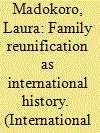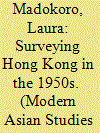|
|
|
Sort Order |
|
|
|
Items / Page
|
|
|
|
|
|
|
| Srl | Item |
| 1 |
ID:
124731


|
|
|
|
|
| Publication |
2013.
|
| Summary/Abstract |
Building on the emerging scholarship that treats the history of global migration as a crucial aspect of international history, this article examines the little known 1973 family reunification agreement between Canada and the People's Republic of China. The article contends that, despite its limitations, the agreement was an important milestone in the history of Sino-Canadian relations. Through a detailed micro-history, the article reveals the shifting political currents that led to the agreement's successful negotiation, highlighting how, by the early 1970s, Canada and other Western nations were embracing the notion of family reunification as an important human rights issue in the ongoing contests of the global Cold War.
|
|
|
|
|
|
|
|
|
|
|
|
|
|
|
|
| 2 |
ID:
173219


|
|
|
|
|
| Summary/Abstract |
From 1975 to 1979, Canadian politicians and diplomats observed and discussed the possibility that a genocide was taking place in Cambodia. The situation was difficult to ascertain, however, given the limited history between the two countries and the deep isolation in which the Khmer Rouge regime operated after rising to power, as well as the Canadian government’s limited interest in international human rights until the late 1970s. It wasn’t until large numbers of refugees began to cross into Thailand in 1977–78, and began to tell their stories to Western diplomats, that human rights discussions at the United Nations began to focus more closely on the situation in Cambodia. Exploring the Canadian government’s use of refugee testimonies, this article explores the relationship between narratives of mass violence and the burgeoning human rights agenda of the late 1970s to highlight the role of refugees in shaping an international human rights agenda.
|
|
|
|
|
|
|
|
|
|
|
|
|
|
|
|
| 3 |
ID:
139677


|
|
|
|
|
| Summary/Abstract |
To what extent are different parts of the world exceptional when it comes to the history of forced migration and refugee experiences? For instance, is forced migration in Asia distinct from developments elsewhere? Or is forced migration in Asia part of wider processes of displacement and emplacement so characteristic of the modern world? Over the past few decades, the fields of refugee and forced migration studies have ballooned. Scholars in a wide range of disciplines,
including anthropology, political science, geography, and history have sought to understand the nature of population displacements in the modern world. Much of the early scholarship in this field focused on Europe in the immediate aftermath of the First and Second World Wars. Scholars have also sought to understand the nature of protracted refugee situations in Africa.More recently, scholars have investigated forced migration within globalized and transnational frameworks.
|
|
|
|
|
|
|
|
|
|
|
|
|
|
|
|
| 4 |
ID:
139680


|
|
|
|
|
| Summary/Abstract |
At the end of the Second World War, there were over a million displaced persons and refugees in Europe alone. Hundreds of thousands of people were uprooted with the expansion of the Japanese empire across the Pacific Theater, and many others were similarly displaced when Japan was defeated. Others later fled civil conflicts, in South Asia, for instance, and in China, where thousands left the mainland during the final days of the Chinese Civil War. Among this massive displacement in Asia, unlike in Europe, only a few groups were identified as refugees. One such group consisted of the migrants in Hong Kong who, after 1949, were understood to be refugees fleeing communist oppression in the People's Republic of China. This article examines the critical role that surveys (population studies designed to account for, and define, refugee groups) played in shaping particular, Westernized Cold War understandings of the refugee experience in Hong Kong. These surveys were organized by non-state interests and undertaken with financial support from major American philanthropies. In examining the objectives and methodologies of the refugee surveys conducted in Hong Kong in the early 1950s, in contrast with studies undertaken contemporaneously in Europe, this article observes that, although at the time the flaws in the surveys were recognized and regularly disregarded in the pursuit of broad political objectives, scholars have failed to adequately recognize the subjective nature of the surveys' supposedly empirical evidence. As a result, the dominant European-based narrative about modern refugees has obfuscated the distinctive aspects of the refugee experience in Hong Kong.
|
|
|
|
|
|
|
|
|
|
|
|
|
|
|
|
|
|
|
|
|